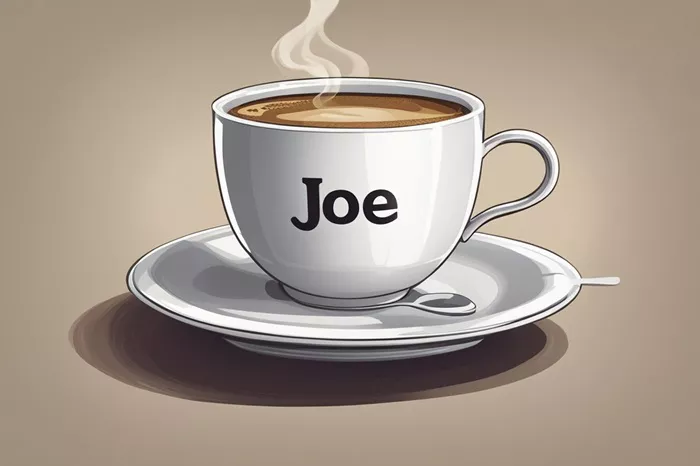Coffee, the beloved beverage that fuels countless individuals worldwide, has long been associated with a term that may raise some eyebrows: “joe.” Whether you’re grabbing a “cup of Joe” in the morning or offering a friend a “fresh brew of Joe,” the phrase has become a staple of everyday language. But where did this nickname for coffee originate? Let’s explore the origins, alternative theories, cultural evolution, and current usage of this popular term.
Origins of the Term
One of the most widely accepted theories behind the term “joe” for coffee dates back to the early 20th century, specifically to U.S. Navy history. In 1914, Josephus Daniels, who was serving as Secretary of the Navy under President Woodrow Wilson, enacted a ban on alcohol aboard Navy ships. As a result, sailors sought a new form of sustenance, turning to coffee as their drink of choice.
Because Daniels’ decision was so impactful, many sailors reportedly began referring to their daily cup of coffee as “a cup of Joe,” in reference to the Secretary of the Navy. While the exact origin of this term remains unclear, this connection to Daniels has become one of the most enduring explanations for why coffee is called “joe.”
Alternative Theories
While the Josephus Daniels theory is perhaps the most famous, there are other possible explanations for the term “joe.”
The Average Joe Theory
Another theory suggests that “joe” is simply a reference to the common man’s drink. “Joe,” as a slang term for an ordinary person, has been part of the American lexicon for over a century. The term “average Joe” is used to describe someone who is ordinary or unremarkable. In this context, a “cup of Joe” could be seen as the drink of the everyday person—no frills, just a basic, reliable cup of coffee.
Evolution from Other Slang Terms
Additionally, the term “joe” may have evolved from earlier slang for coffee. The word “java,” for instance, has been used to refer to coffee since the 19th century, stemming from the island of Java, a major coffee-producing region. Similarly, “jamoke” (a combination of “java” and “mocha“) was a slang term used for coffee in the early 20th century. It’s possible that “joe” was simply a natural evolution or simplification of these earlier terms.
Cultural and Linguistic Evolution
Slang terms often evolve organically, as words or phrases are shortened, modified, or repurposed in everyday speech. The evolution of the term “joe” exemplifies how language is shaped by social, cultural, and historical forces.
In the case of coffee, the transition from “java” or “jamoke” to “joe” is part of a broader linguistic trend in which words become more accessible and easier to say. Once adopted by the masses, these slang terms become ingrained in popular culture and everyday language.
Over the years, “joe” has permeated many aspects of popular culture. In films, TV shows, and music, characters are often depicted enjoying a “cup of Joe,” reinforcing the term’s place in modern vernacular. In fact, the widespread use of “joe” in media has helped to solidify its status as a cultural staple.
Historical Context
The popularity of the term “joe” coincides with significant historical changes, particularly in the social and economic landscape of the United States. Coffee became an essential part of daily life during the 20th century, as both World Wars and the rise of the American coffee industry solidified its place in the nation’s routine. In this context, “joe” was likely embraced as a simple, working-class term for the drink that fueled the country’s labor force.
Additionally, coffee was not just a beverage of convenience—it was also a symbol of the era’s growing consumer culture. As coffee consumption boomed, language evolved to reflect its ubiquitous presence in American life, and “joe” became a familiar and affectionate nickname.
Current Usage
Today, “joe” is widely recognized as a casual, colloquial term for coffee. Whether you’re ordering at a café or chatting with a friend, a “cup of Joe” remains one of the most common ways to refer to coffee. The phrase has become so entrenched in everyday language that it has appeared in a variety of idioms and expressions, including “coffee break,” “morning Joe,” and “good old cup of Joe.”
In contemporary times, “joe” is also used to refer to a variety of coffee-related concepts, such as a strong, no-frills brew or a daily routine that involves coffee consumption. The term has maintained its cultural relevance, with phrases like “let’s grab a cup of Joe” and “I need my morning Joe” remaining part of modern speech.
Conclusion
The nickname “joe” for coffee has a rich and somewhat mysterious history. Whether it originated from Josephus Daniels, evolved from slang terms like “java” and “jamoke,” or emerged as a reference to the common man’s drink, its place in the language is undeniable. As coffee culture continues to thrive and evolve, so too will the ways in which we refer to the beverage that unites us all. So, the next time you sip your favorite brew, remember: you’re enjoying not just a cup of coffee, but a piece of linguistic history wrapped in a familiar, comforting name.
Related topics:


